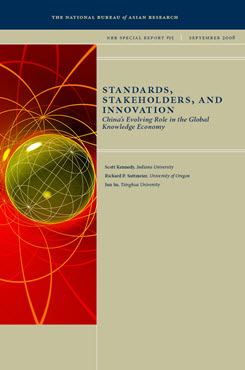NBR Special Report no. 15
Standards, Stakeholders, and Innovation
China's Evolving Role in the Global Knowledge Economy
This report examines the circumstances in which China’s efforts to develop its own technology standards are occurring and assesses the implications and prospects for success of the initiatives.
EXECUTIVE SUMMARY
MAIN ARGUMENT
- In information and communications technologies (ICT), China is making a long-term commitment to the development of standards as part of an effort to promote domestic technological innovation and make China an “innovative society.”
- China’s aspirations to become a standards setter in ICT should be seen against a background of institutional uncertainty in an international economy struggling to devise mechanisms of governance to accommodate rapid technological change and the emergence of large economies, and amidst a pluralism of views on techno-nationalist versus techno-globalist approaches.
- China’s efforts to set and commercialize ICT standards domestically have met with only limited success due to inappropriate government intervention, failures to forge winning coalitions in standards-setting forums, and an inability to displace established international standards. Nevertheless, China is learning from experience, will push forward with standards development, and is likely to have greater success in the future.
- China has achieved some success in having its domestic standards adopted internationally and has made some contributions to jointly developed standards, but has proven less capable of blocking standards initiatives that it opposes. Those elements of the Chinese government, research community, and industry that are most deeply integrated into the global economy have had the greatest chance for success because they have more quickly adapted to the global standards system.
POLICY IMPLICATIONS
- The techno-nationalist sentiments sometimes associated with China’s standards initiatives should be tempered with a techno-globalist vision, both to promote the technological progress of the Chinese economy and to contribute to the provision of international public goods.
- The international community will want to monitor the implementation of China’s innovation and standardization strategies and work with China in developing its capabilities for standards development.
- The international community can accommodate the emergence of a technologically dynamic, standards-setting China by facilitating Chinese participation in international standards bodies and consistently engaging Chinese experts, industry, and officials.



